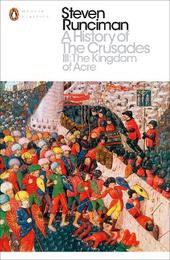
|
A History of the Crusades III: The Kingdom of Acre and the Later Crusades
Paperback / softback
Main Details
| Title |
A History of the Crusades III: The Kingdom of Acre and the Later Crusades
|
| Authors and Contributors |
By (author) Steven Runciman
|
| Series | Penguin Modern Classics |
|---|
| Physical Properties |
| Format:Paperback / softback | | Pages:480 | | Dimensions(mm): Height 198,Width 130 |
|
| Category/Genre | Asian and Middle Eastern history |
|---|
| ISBN/Barcode |
9780241298770
|
| Classifications | Dewey:909.07 |
|---|
| Audience | |
|---|
|
Publishing Details |
| Publisher |
Penguin Books Ltd
|
| Imprint |
Penguin Classics
|
| Publication Date |
24 November 2016 |
| Publication Country |
United Kingdom
|
Description
Runciman's great Crusades trilogy reissued in Penguin Modern Classics 'The whole tale is one of faith and folly, courage and greed, hope and delusion' In 1187 the catastrophic Battle of Hattin resulted in Saladin's destruction of the crusaders' main army. In an atmosphere of total crisis, the three principal leaders of Europe, Philip Augustus, Richard the Lionheart and Frederick Barbarossa decided that they should personally lead armies to relieve the beleaguered survivors. A triumph of prose-writing, argument and research, Steven Runciman's A History of the Crusades is an unimprovable account of events which changed the world and which still resonate today. In this final volume he starts with the glamorous Third Crusade and then tells the later story as the crusader states collapsed - a less well-known but fascinating period where crusaders found themselves fighting everywhere from Egyptian swamps to the Great Hungarian Plain and the apparent clarity of the original urge to liberate Jerusalem seemed a distant dream.
Author Biography
Sir Steven Runciman (1903-2000) was one of the greatest British historians. He drastically recast how we think about both the Crusades and the history of Byzantium. His major works include The Sicilian Vespers (1958), The Great Church in Captivity (1968), Byzantine Style and Civilization (1975) and Mistra (1980).
|